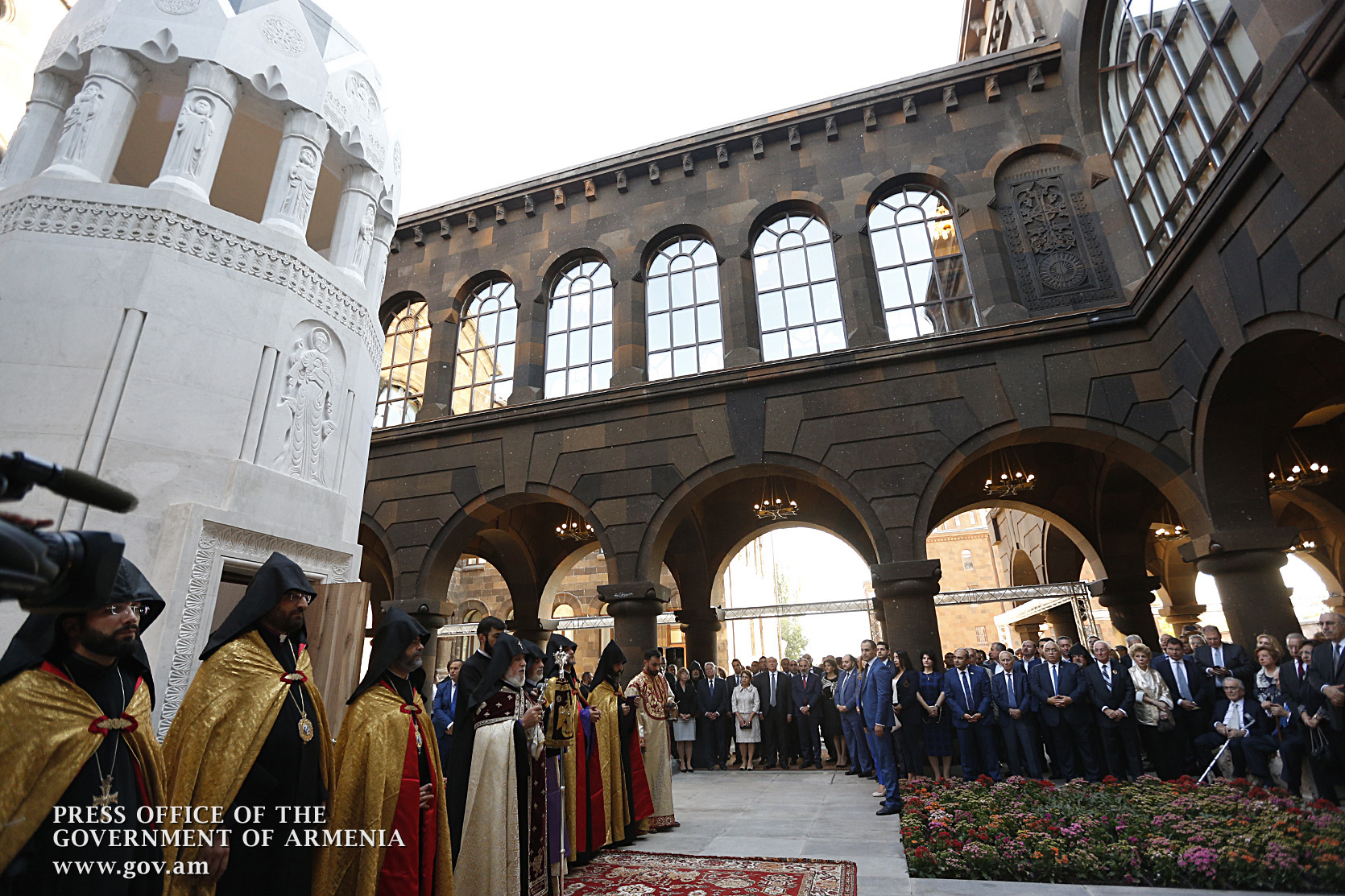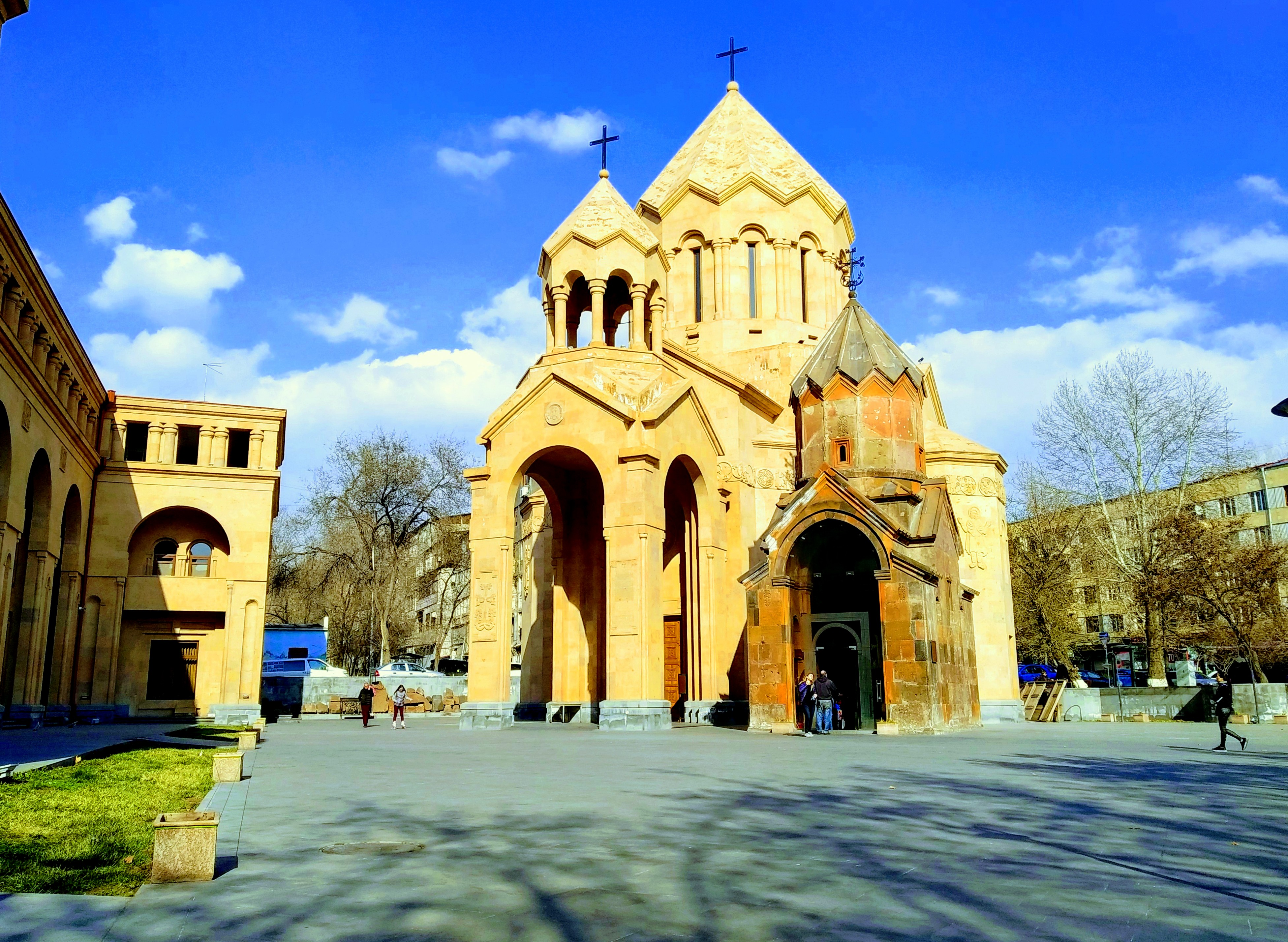
Last week, we addressed an uncomfortable topic. It is challenging to discuss this in a way that contributes to an improvement, but it is a healthy step for us to take together. Our holy church was founded by a command from our Lord. We know that Christ descended and struck the ground with a golden hammer and commanded St. Gregory to build a cathedral on that site. For that reason, the cathedral was named Etchmiadzin or “the descent of the only begotten.” Think about that for a minute. Our people were not only evangelized directly by two of Christ’s Apostles (Thaddeus and Bartholomew), but when the nation embraced their faith, our Lord directed where to build the first sanctuary.
In that context, we have a major responsibility as Armenian Christians. It is part of our inheritance from previous generations starting with the early embracing of the light. First we have the personal responsibility to love God and each other. The latter is particularly challenging, but it is our mission.
Our other responsibility as Armenian Christians is to embrace and protect the church we have been given—His church. What this means to me is that we should always work for the church with a pure heart. No hatred, no egos, no destructive behavior—tall orders, but who said it was going to be easy? Our constant lapses are our sins, but God will absolve us of that burden with a pure heart. Now that’s love.
Our institution called the Armenian Church is under duress. It is challenged by a secular society and a lack of faith; but it’s also challenged by itself. This is manifested by silent leadership or with overt corruption. All of them are threats to the gift we have received. We have a responsibility. The question is how do we approach the challenge?
It should be clear by now that ambivalence and ignoring the problem are not working and clearly fall out of line with our core responsibility. On the other hand, addressing the corruption issue with gossip, hatred and rhetoric not only does nothing to improve our dilemma, but it is not in keeping with our faith. We have all heard the saying, “two wrongs don’t make a right.” Last week we spoke about the Vehapar in Etchmiadzin not being “transparent” about these immediate concerns. In advocating for responsibility, we must maintain our dignity. We must always pray on this matter. Pray for transparency from the Vehapar, but also pray that our lay and clergy leaders take responsibility to protect the integrity of the church.
I believe that part of the problem today is that our “culture” of subordinating ourselves to hierarchy and being fearful of “public” discussions have relegated corruption in the church to a non-issue in the meeting of Diocesan Councils and Assemblies, but has fueled the gossip and informal dialogue. This must change if we are to focus on being responsible and productive. Recently, there has been some visibility given to the new Veharan being built at Holy Etchmiadzin and the need for fundraising. I, for one, do not believe this is a good move. As long as we have people living in poverty in Etchmiadzin (and we have many), the church has no business adding to the comfortable lifestyle and reception facilities. How about asking the benefactors to build a housing complex or boost job creation? Widening the gap between the walls of Holy Etchmiadzin and the local population is part of the problem. Prominent Armenians from the diaspora will tour the complex with pride. Will they feel the same way if they visit the impoverished areas as well? I realize that many benefactors do wonderful work, but making Holy Etchmiadzin more opulent is not appropriate. Decisions can also be “corrupt.”
our faith finds its source with God
I would suggest a parallel path. The lay and clergy leaders operate where the common faithful do not. They have access to the Vehapar. Influence perhaps would be a correct way to describe some of our major benefactors and “players.” You have a responsibility to use that influence for the benefit of the church. This is less about the Vehapar in Holy Etchmiadzin and more about the prosperity of our Holy Church.
I believe that “this too shall pass” in reference to the corruption perceptions of the church. The question is not if, but when. This should never be about hatred or anger, but more about our love for a healthy church. What about the rest of us who do not hold positions of authority and influence? It is time for us to stop playing victim and insist on accountability from our leaders. This is risky and almost counter-cultural to a community that has a tradition of accepting silent leadership. Next time you attend a Diocesan Assembly, parish meeting or even meet socially with a person of influence, ask yourself a simple question. What am I doing to make it better? Wayward leadership exists primarily because followers do not hold them accountable. Let’s all take responsibility to keep our church on the true path.

As we grapple with the impact of the corruption perceptions, I wanted to share an experience that reinforces my belief in the beauty of our church and why it is most worthy of our commitment. While I was in Armenia this past month, I attended badarak at the Soorp Anna church in Yerevan. For those familiar with the city, it is at the corner of Sayat Nova and Abovyan Streets. It was built on the site of the preserved Katholike chapel. Regardless of what is going on in our lives, when I experience the Soorp Badarak, I am consumed with a feeling of calm, peace and joy. It doesn’t matter whether I am in Boston, Paris, Singapore or Armenia. The universal nature of our church prevails. No exception on those Sundays in Yerevan. The church is stunning with marble and tuf stone and beautiful paintings depicting our faith and heritage. But what made this experience unique were the faithful in attendance. Whenever I go to church in Armenia, my mind wanders a bit to think about the faith-limited days of the Soviets where very few churches were open and many children were not baptized. I looked around the packed sanctuary and observed a very balanced age group. There were many older people which made me say to myself, “God bless them. They didn’t lose their faith.” There were many families which warmed my heart that in post-independence Armenia the church is revived. There were young children and babies everywhere making their age appropriate chatter. That’s so wonderful because, as I’ve mentioned in my previous columns, a church without the sounds of children is a church with a limited future. By far the most incredibly emotional experience, however, was during the “topor” or the procession around the periphery of the sanctuary. We have lost some of the most beautiful aspects of this part that have continued in Armenia. When the procession comes off the altar, it is led by a young tbir (acolyte) who holds a cloth pouch in front of himself. It is during the procession that the faithful offer “khoong” or incense for the service. You can purchase a small bag along with memorial candles, but what I found amazing were the people milling through the crowd to offer some of their incense to others so they too could participate. Topor in Armenia takes a little longer as there is a continuous rush of the faithful towards the procession. The procession consists of altar servers and deacons carrying banners adorned with images of the Virgin Mary, Christ Our Savior and others. The faithful rushed the procession to touch or kiss the banners. At the end of the procession is the priest, of course, offering a blessing to all. The surge of spiritual emotion was amazing. My wife was initially anxious as the crowd gently pushed forward creating significant human density. But it was not like a crowd pushing at a rock concert. It was more of a respectful and peaceful sway towards the truth. If you have not experienced this, I encourage all of you to go soon and go often. People in the church were hugging each other in Christian love. It was a beautiful moment.
In the days of the oligarch corruption in Armenia, many from the diaspora were (and perhaps still are) fearful of donating because of this perception. Many advised people to continue, but find causes that “fly under the radar” of the corruption. There is so much work to do and thus the efforts of many NGOs, non-profits and individuals continued and were established. The corruption needed to go, but you find a way to persevere. The Badarak is the church’s version of “flying under the radar.” It is pure, beautiful and spiritually fulfilling. It provides us the nourishment to face the daily lives and make a difference. It is corruption-free. It should also provide us with the inner peace and courage to deal with some of the challenges that are “flying above the radar.” This includes our responsibility to keep the institution on the true path. Perceptions of corruption slow us from embracing that path. Together, we can all make a difference. The corruption is man-made and will pass. But our faith finds its source with God and is eternal.



Bravo Stepan. Not only was this a well written article, but it was very sensitive and offered hope for the future of our church, our people and our beautiful culture that revolves around our faith. We definitely need to pray that the leadership will follow suit to bring this chapter to a conclusion that is better than just satisfactory. Your articles and perspectives are always inspiring.